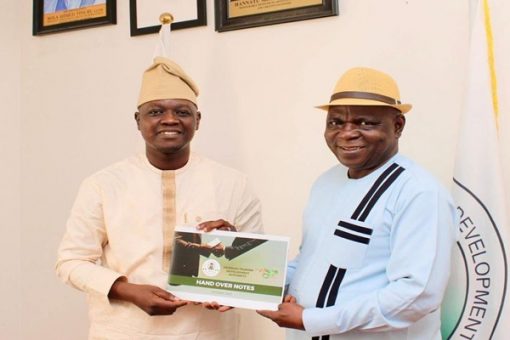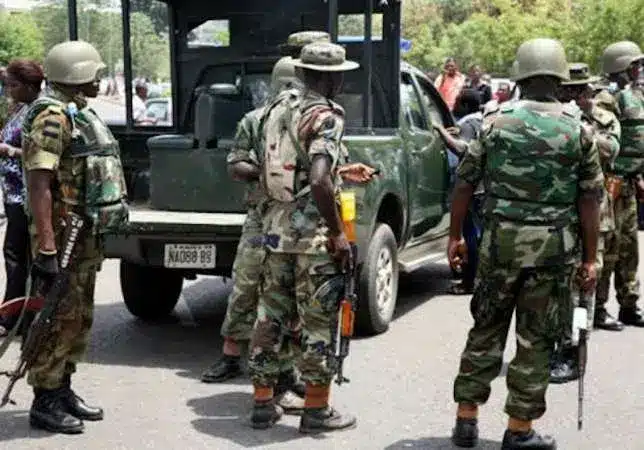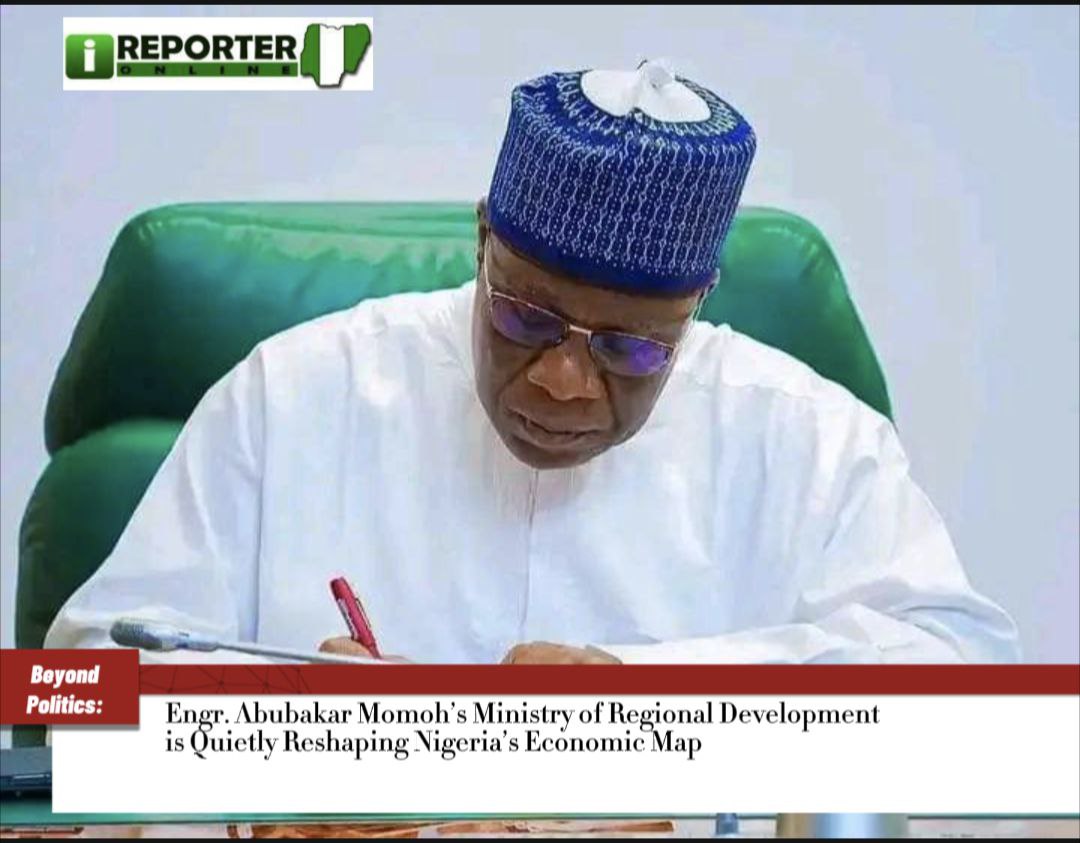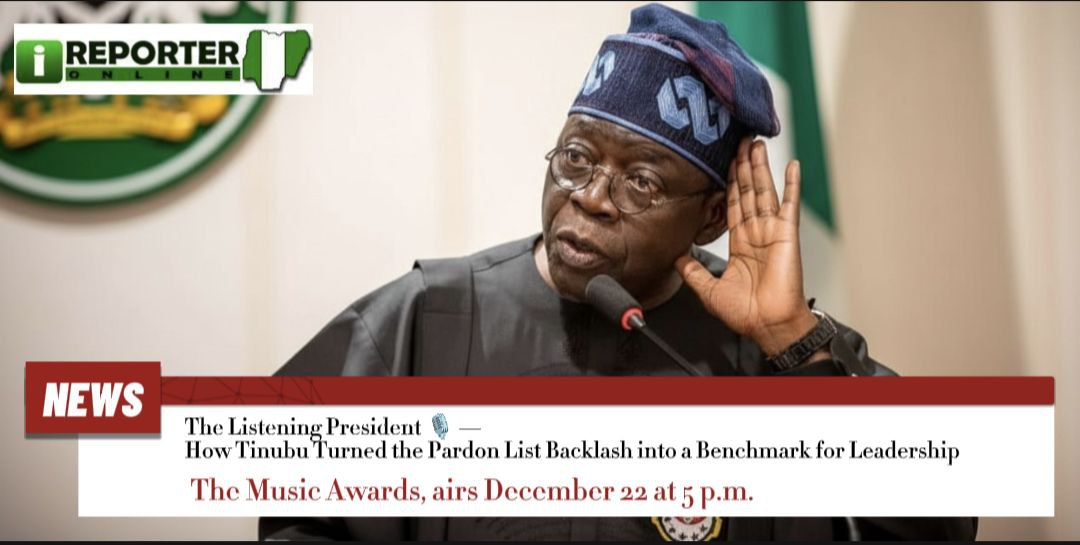latest
Awakan Pledges To Propel Tinubu’s Renewed Hope Agenda Through Tourism.

The newly appointed Director-General of the Nigerian Tourism Development Authority (NTDA), Mr. Olayiwola Awakan, has pledged to steer Nigeria’s tourism sector into a new era of innovation, collaboration, and strategic growth. Awakan, who officially assumed office at the NTDA headquarters in Abuja on Monday, vowed to build on the successes of his predecessors while transforming the Authority into a more vibrant and efficient organization capable of attracting tourists and investors.....KINDLY READ THE FULL STORY HERE▶
“My predecessors have performed admirably, and the leadership baton has now been passed to me. I am committed to taking it further,” Awakan stated.
Upon his arrival, Awakan was received by the Authority’s management team, led by Mr. Ovie Esewhaye, Director overseeing the Office of the Director-General, who handed over the official documents. He subsequently toured the NTDA offices, met with directors, and addressed staff at the NTDA Village Hall.
Expressing gratitude to President Bola Ahmed Tinubu, Awakan highlighted his resolve to advance the Renewed Hope Agenda through tourism. He also acknowledged the Minister of Arts, Culture, Tourism, and Creative Economy, Hannatu Musa Musawa, for her dedication in repositioning the sector despite limited resources.
Awakan emphasized teamwork, innovation, and inclusivity as central to achieving NTDA’s mandate. “We need collaboration and fresh ideas. I operate an open-door policy; no idea is too small. Together, we can make history and make Mr. President proud,” he stated.
An accomplished journalist, dramatist, poet, and culture enthusiast, Awakan’s appointment signals the administration’s commitment to leveraging tourism, creativity, and culture as key drivers of economic diversification and national growth.
latest
Two Military Officers On The Run As Coup Probe Tightens In Nigeria.

Two Nigerian military officers have reportedly fled the country as security agencies intensify arrests linked to an alleged plot to overthrow the nation’s democratic government.....KINDLY READ THE FULL STORY HERE▶
According to Nivo News, the officers escaped shortly before authorities launched a fresh wave of arrests connected to the foiled coup attempt, which has already resulted in the detention of at least 16 personnel since early October.
One of the officers, identified as Major J. M. Ganaks with service number N/14363, is said to be a member of Regular Course 58 of the Nigerian Defence Academy (NDA). He hails from the Federal Capital Territory and was last deployed at Jaji, Kaduna State.
The second officer, Captain G. Binuga, bearing service number N/167722, hails from Taraba State and belonged to Regular Course 64. His last posting was at the Defence Headquarters Special Operations Force (SOF) in Bida, Niger State.
Reports indicate that both officers were among 18 personnel initially slated for arrest but managed to evade capture and are now believed to have left the country.
Investigations led by the Defence Intelligence Agency (DIA) have reportedly yielded “useful statements” from those already in custody. A senior security official disclosed that information obtained during interrogations had facilitated additional arrests, pushing the number of detained officers to over 30.
“Some of the arrested officers have remained silent, but several others have been very cooperative,” the source noted.
The arrests are part of an extensive national operation targeting military personnel accused of conspiring to destabilize President Bola Tinubu’s administration.
latest
Beyond Politics: Engr. Abubakar Momoh’s Ministry of Regional Development is Quietly Reshaping Nigeria’s Economic Map

Beyond Politics: Engr. Abubakar Momoh’s Ministry of Regional Development is Quietly Reshaping Nigeria’s Economic Map....KINDLY READ THE FULL STORY HERE▶
True leadership is rarely loud — it is defined by quiet revolutions that reshape systems. Under the stewardship of Hon. Engr. Abubakar Momoh FNSE, the Federal Ministry of Regional Development has become the understated powerhouse driving Nigeria’s new regional balance and economic inclusivity.
From the South-South to the North-East, the Ministry’s mandate has evolved from mere coordination to tangible transformation — building bridges between regions, catalyzing industrial zones, and strengthening the framework for balanced national development.
Through his strategic oversight and technical depth, Engr. Abubakar Momoh has positioned the Ministry as the coordinating heartbeat of Nigeria’s regional growth architecture. Under his guidance, development commissions such as the NDDC and NEDC are already executing their mandates remarkably well, delivering visible results in infrastructure renewal, education, and community empowerment.
At the same time, the newly established NCDC, SWDC, SEDC, and SSDC are diligently developing a comprehensive master plan aimed at accelerating development within their respective regions — a roadmap that will ensure every zone of the country benefits from the Renewed Hope vision of President Bola Ahmed Tinubu.
It is therefore no surprise that President Tinubu found in Engr. Momoh a leader with both the competence and credibility to steward such a pivotal national assignment. His track record — from the classroom to the legislature and now to the Federal Executive Council — has consistently reflected discipline, delivery, and results. And true to form, he has not disappointed.
Under his guidance, the Ministry has prioritized performance bonds, ensuring that every board and agency under its supervision is accountable and result-oriented. These reforms are not just about projects — they’re about people: students accessing new learning facilities, farmers gaining road access to markets, and youths being empowered through skill programs across the six geopolitical zones.
While others trade words, Engr. Momoh continues to trade in results. His approach — quiet, methodical, and inclusive — reflects a belief that leadership is best expressed through delivery, not drama.
In the coming months, Nigerians can expect even greater synergy between regional commissions and development partners, as the Ministry of Regional Development cements its role as a national engine for equity, productivity, and sustainable growth.
By Osigwe Omo-Ikirodah, writing for iReporteronline — a publication of Bush Radio Academy.
latest
The Listening President — How Tinubu Turned the Pardon List Backlash into a Benchmark for Leadership

The Listening President ️ — How Tinubu Turned the Pardon List Backlash into a Benchmark for Leadership
There is a moment in every democracy when a leader faces a mirror: hears the anger, reads the headlines, senses the churn. That moment is not always comfortable. But when a leader listens — when he recalibrates in sight of public sentiment — it becomes a moment of hope. That is exactly what we saw when President Bola Ahmed Tinubu reconsidered his earlier pardon list and acted on the backlash.....KINDLY READ THE FULL STORY HERE▶
Let’s be frank — the very essence of a presidential pardon involves criminals. You can’t pardon saints. These are men and women who, at one point, broke the law and faced justice. So, naturally, any such list will feature individuals convicted of serious offences. And here’s the truth many overlook: nobody appears on that list by accident. It is usually those who have someone — a religious body, community leader, traditional ruler, political ally or advocacy group — fighting for their clemency that get heard. Mercy petitions are rarely spontaneous; they are lobbied, documented, and defended. Some come through institutional recommendations, others through humanitarian pleas, and a few through political channels. That is the complex reality behind every “pardon list.”
So when the earlier list of 175 names was released — featuring people convicted of crimes like kidnapping, trafficking, and unlawful possession of arms — Nigerians naturally cried out. The optics were bad. The process seemed opaque. Questions filled the air: Who prepared this? What criteria were used? The outrage was legitimate — because mercy must not mock justice.
And then came the turnaround.
Instead of brushing off public anger or hiding behind bureaucracy, Tinubu’s administration did something remarkable: it listened. The Presidency recalled the list, reviewed it through the Advisory Committee on the Prerogative of Mercy, and released a refined version with the most controversial names struck out. Even more, oversight was tightened — moving the process squarely under the Ministry of Justice to prevent future excesses.
That single act of correction is not weakness — it’s responsiveness.
Leadership is not about pretending to be flawless; it’s about being flexible enough to improve. For Tinubu to revisit a sensitive decision under public pressure shows empathy, maturity, and a deep understanding of democratic accountability.
Let’s remember: the power of pardon under Section 175 of the 1999 Constitution doesn’t operate in isolation. The president acts based on layered recommendations — from committees, the Ministry of Justice, and sometimes the Council of State. Meaning, some names slip in through multiple hands before reaching the Villa. But what matters most is not how errors enter the system; it’s how leadership responds when they’re revealed.
By trimming the list and removing those whose crimes carry heavy social and security implications, the president signalled that mercy should be tempered with wisdom. It was a balance between justice and compassion — and that balance is the essence of governance.
In truth, this is what Nigerians should focus on: not just the outrage that forced the correction, but the humility that allowed it. Every democracy thrives when leaders can hear the pulse of the people — and adjust their stride. It’s not common in our political space for a president to publicly amend a decision after criticism; that act alone deserves recognition.
Of course, cynics will still scoff — calling it “damage control.” But even if it is, isn’t accountable damage control far better than stubborn indifference? Would we rather have leaders who never correct themselves?
So, yes, we must always hold our leaders accountable, but we must also give credit where it’s due. Tinubu’s reconsideration of the pardon list is not merely a procedural tweak — it’s a reminder that power can still listen.
Because when leadership listens, democracy breathes.
When people speak, and government adjusts — hope survives.
And that, right there, is the heartbeat of the Renewed Hope Agenda.
By Osigwe Omo-Ikirodah
Bush Radio Academy, inspired by Osigwe Omo-Ikirodah, is a grassroots-driven institution focused on empowering individuals through storytelling, citizen journalism, and innovative communication tools to amplify overlooked voices.
-

 latest2 months ago
latest2 months ago“Social Media Erupts As Jim Iyke Declares Rita Dominic Nollywood’s Most Beautiful”
-

 latest2 years ago
latest2 years agoEdo Political Showdown: Oshiomhole Appears At Presidential Villa As Tinubu Hands APC Gubernatorial Flag To Okpebholo (Photos & Video)
-

 latest2 years ago
latest2 years agoOlumide Akpata Strikes Again: Drops Killer Track, Sends Edo State Into Frenzy!(Video)
-

 entertainment2 years ago
entertainment2 years agoLove Knows No Age American Woman Defends Marriage To Young Nigerian Man “I’m Not 70”
-

 latest2 years ago
latest2 years agoFG Identifies 31 States At Risk Of Heavy Flooding In 2024: See Full List
-

 Politics2 years ago
Politics2 years agoNigerians React As Pastor Adeboye Foresees Passing Away On A Sunday After Enjoying A Satisfying Meal Of Pounded Yam
-

 latest2 years ago
latest2 years ago5 NYSC Corpers Perish In Fatal Road Accident Returning From Camp
-

 Politics2 years ago
Politics2 years agoBREAKING: Inspector-General Of Police Summons Top Police Commanders For Crucial-Security Challenges
